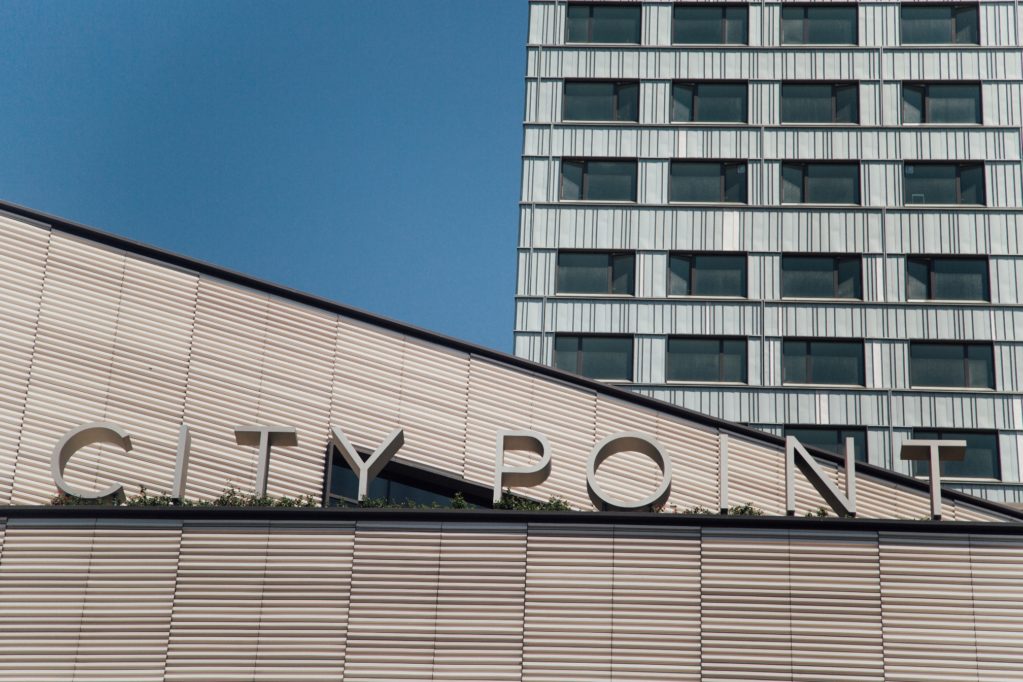Catalytic multi-use development generates thousands of jobs, provides affordable housing, and brings fresh food and retail opportunities to an underserved neighborhood in Brooklyn, NY.

THE PROJECT:
The City Point project (City Point) is a three-phase development of a LEED Silver, 1.8 million gross-square-foot retail and residential complex located in downtown Brooklyn, New York. NMTC allocation was utilized in the Phase 2 of development to construct an approximately 649,000 gross-square-foot retail podium. Included in Phase 2 is an 18,000 square-foot, full-service grocery store that is managed by a local operator; and the Brooklyn Market, an 11,000 square-foot market hall that includes local food purveyors. Both provide fresh, healthy food in an area with a lack of grocery store and restaurant options.
City Point received broad support from various levels of government as it greatly enhanced the revitalization of Downtown Brooklyn, an area the City of New York has targeted as a key area for economic stimulus. City Point implements major development objectives of the 2004 Downtown Brooklyn Plan and Mayor Bloomberg’s Five Borough Economic Opportunity Plan, including affordable housing, street-scape improvements and high-quality design standards. City Point is also located in an established Food Retail Expansion to Support Health (FRESH) zone, a program created by New York City’s Food Policy Task Force in order to provide financial incentives for doing business in communities underserved by grocery stores and fresh food options.
City Point is committed to supporting the local minority workforce and low-income residents by targeting a large percentage of new, permanent jobs to be filled by persons who have an income that is below 200% of the poverty level within their residence zip code, and by hiring a portion of contractor and subcontractor positions to be filled by women and minority employees. Additionally, in Phase 3 of development approximately 647,000 gross-square-feet (240 residential housing units) will be available for rent, with 120 units set aside for low-income persons.
COMMUNITY IMPACTS:
- Create 1,708 construction jobs, 979 direct permanent jobs and 5,143 total direct and indirect jobs as calculated by the New York City Regional Center using the RIMS II methodology to calculate jobs.
- Provide meaningful job training through New York City’s Department of Small Business Services, with skills training and higher education in connection with the new jobs.
- Provide commercial goods and services to residents of low-income communities including retail including a food market, grocery store and movie theater.
- Achievement of several hiring goals outlined in the Minority and Women Business Enterprise & Local Hiring Utilization Plan with New York City Economic Development Corporation.
- Create environmentally sustainable outcomes with a transit-oriented development, meeting LEED Silver Certification, and incorporating a green roof and a central mechanical plant.
- Increase access to fresh and healthy food for low-income persons located in an area demonstrating lack of access to grocery stores and restaurant options (i.e., FRESH zone).
KEY COMMUNITY DEMOGRAPHICS:
- Poverty Rate: 24.7%
- Median Family Income: 27.6% of benchmark
- Unemployment Rate: 1.36 times the national average
- FEMA Disaster Area
- Five-Borough Economic Opportunity Plan and Downtown Brooklyn Plan
- New York City’s Food Retail Expansion to Support Health zone
FINANCING:
- Total Project Cost: $454.9 million
- NCF Deployed Allocation: $10.0 million
- Total NMTC Allocation: $20.0 million
PROJECT PARTNERS:
- United Fund Advisors (National Community Fund I, LLC)
- New York City Economic Development Corporation
- Goldman Sachs
- Acadia Realty Trust (an affiliate of Acadia Albee LLC)
- Washington Square Partners
